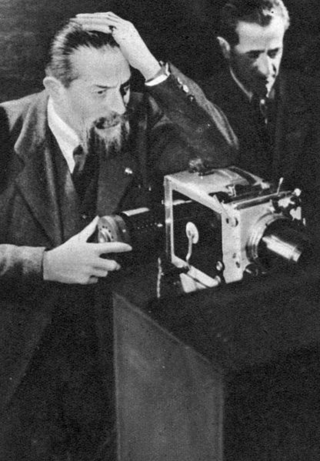Related Research Articles

The cinema of Italy comprises the films made within Italy or by Italian directors. Since its beginning, Italian cinema has influenced film movements worldwide. Italy is one of the birthplaces of art cinema and the stylistic aspect of film has been the most important factor in the history of Italian film. As of 2018, Italian films have won 14 Academy Awards for Best Foreign Language Film as well as 12 Palmes d'Or, one Academy Award for Best Picture and many Golden Lions and Golden Bears.

Alessandro Blasetti was an Italian film director and screenwriter who influenced Italian neorealism with the film Quattro passi fra le nuvole. Blasetti was one of the leading figures in Italian cinema during the Fascist era. He is sometimes known as the "father of Italian cinema" because of his role in reviving the struggling industry in the late 1920s.

Quo Vadis is a 1924 Italian silent historical drama film directed by Gabriellino D'Annunzio and Georg Jacoby and starring Emil Jannings, Elena Sangro, and Lillian Hall-Davis. It is based on the 1896 novel Quo Vadis by Henryk Sienkiewicz which was notably later adapted into a 1951 film.

Arturo Ambrosio (1870–1960) was an Italian film producer who was a pioneering and influential figure in the early years of Italian cinema.

Maciste in the Lion's Cage is a 1926 Italian silent adventure film directed by Guido Brignone and starring Bartolomeo Pagano, Elena Sangro and Luigi Serventi. It was part of the popular Maciste series of films. It was the penultimate film of the silent series, followed by The Giant of the Dolomites (1927)

Ambrosio Film was an Italian film production and distribution company which played a leading role in Italian cinema during the silent era. Established in Turin in 1906 by the pioneering filmmaker Arturo Ambrosio, assisted by cinematographers Giovanni Vitrotti and Roberto Omegna, the company initially produced large numbers of documentary and fictional short films, but its output quickly grew more ambitious.

Roberto Omegna was an Italian cinematographer and film director.
Emperor Maciste is a 1924 Italian silent adventure film directed by Guido Brignone and starring Bartolomeo Pagano, Domenico Gambino and Franz Sala. It was part of the peplum series of silent films featuring the strongman Maciste. The character of Maciste increasingly came to resemble Benito Mussolini, in this case striking Fascistic poses and defending order against criminal and dishonest elements.

Steel is a 1933 Italian drama film directed by Walter Ruttmann and starring Piero Pastore, Isa Pola and Vittorio Bellaccini. The film was shot on location at the steel mills in Terni in Umbria. It was based on the novel Giuoca, Pietro! by Luigi Pirandello. With its semi-documentary style it was one of a number of films made in the Fascist era that serve as a precursor to Italian neorealism which emerged in the mid-1940s.
Milano Films was an Italian film production company of the silent era. Founded in Milan in 1908, it was one of the leading Italian film companies of the 1910s employing directors such as Baldassarre Negroni and Augusto Genina and actors including Lina Millefleurs, Mercedes Brignone and Pina Menichelli.

Stefano Pittaluga was an Italian film producer, one of several figures who helped revive Italian film production in the late 1920s and early 1930s.

L'Armata Azzurra is a 1932 Italian aviation docu-drama and adventure film directed by Gennaro Righelli and starring Germana Paolieri and Ennio Cerlesi. It was Italy's first aviation drama film, with a fictional story that celebrated the Italian Air Force.

Giuseppe Barattolo (1882–1949) was an Italian lawyer, politician and film producer. In 1913, during the silent era, Barattolo founded Caesar Film. Caesar made a series of popular films, some of which starred Francesca Bertini. In 1919 he joined and became an influential figure at the conglomerate Unione Cinematografica Italiana which dominated Italian film production during the early 1920s, but this came to an end following the box office failure of Quo Vadis (1924). In the early 1930s he tried to re-establish Caesar Film as a serious force in Italian production, but this also failed.

Julius Caesar is a 1914 Italian silent historical film directed by Enrico Guazzoni and starring Amleto Novelli, Bruto Castellani and Pina Menichelli. Taking minor inspiration from William Shakespeare's 1599 play of the same title, the film portrays the events leading up to the assassination of Julius Caesar. In the wake of Guazzoni's internationally successful Quo Vadis it was produced on an epic scale, including vast sets recreating Ancient Rome and more than 20,000 extras.

The Banca Italiana di Sconto (BIS) was a leading Italian bank that went bust in 1921. One firm hit by its collapse was the giant film production conglomerate Unione Cinematografica Italiana (UCI), which itself folded a few years later. Another victim was Banca per l'Africa Orientale (BAO) whose formation in 1917 BIS had promoted. BAO failed in 1923.

Baron Alberto Fassini (1875–1942) was an Italian business tycoon and film producer. Fassini owned a large synthetic textile company, and was close to the regime of the dictator Benito Mussolini. He owned the Palazzo Tittoni where Mussolini lived from 1923 to 1929.
Scalera Film was an Italian film production and distribution company which operated between 1938 and 1950. It had strong backing from the Italian state, as the Fascist government of Benito Mussolini was keen to build up and centralise the Italian film industry. It was founded by the brothers Michele and Salvatore Scalera, and primarily based at the Scalera Studios in Rome. In 1943 during the German occupation of Rome, the studio was relocated to Venice in the Italian Social Republic as part of a planned Cinevillaggio film complex developed by Mussolini loyalists.
Caesar Film was an Italian film production and distribution company founded in 1913. The studio's owner Giuseppe Barattolo built it into one of the more successful silent film companies of the 1910s, thanks partly to signing up the diva Francesca Bertini to make a series of films.
The Cines Studios were film production studios located in the Italian capital Rome. They were established on Via Veio in 1930 by Stefano Pittaluga, head of the Cines film company, at the beginning of the sound era. It produced Italy's first sound film The Song of Love the same year. For several years it was the leading studio complex in Italy, until September 1935 when it suffered a major fire and was largely destroyed. This became a spur for the Italian government of Benito Mussolini to invest in the construction of a new development Cinecittà, the largest studio in Europe which opened in 1937.

Itala Film was an Italian film production company.
